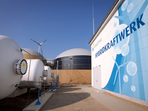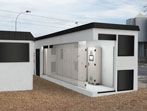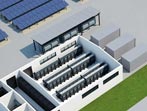Energy Storage & Distribution
Renewable energies are becoming a major part of the power generation mix. But these resources are depending highly on environmental factors. ALFA Power Solutions helps customers to make the most of them by shifting the power generation to the most profitable times or aligning it with consumption peaks. Battery energy storage also keeps the production within the grid stability requirements.
Through the increasing number of fluctuating renewable energies, grid operators are facing more and more difficulties to keep the grid stabilized. Grid frequency and voltage have limited operating areas and have to be continuously regulated to guarantee the grid stability. Furthermore renewables cause power peaks which can exceed the grid's capacities. A backup storage will here save costs and will give you more flexibility.
Load management or demand side management (DSM), is the process of balancing the supply of electricity on the network with the electrical load by adjusting or controlling the load rather than the power station output. Load management allows utilities to reduce demand for electricity during peak usage times, which can reduce costs by eliminating the need for peaking power plants.
Hybrid battery energy storage systems combined with a power-to-heat (PTH) solution provide several advantages: The installed thermal PTH system, which is already used for additional applications, provides negative power which is usually limited to the secondary reserve market. By combining both systems, the capacity of the thermal storage adds up to the installed BESS capacity. In this case only 600 kWh instead of 1000 kWh battery capacity is required. Overall this results in a reduced CAPEX of 30 - 40%.
Grid linked micro grids offer three primary benefits for utilities (DNOs) and transmission network operators (TNOs):
1. protecting the macrogrid from the microgrid (eliminating fault current contributions)
2. allowing the microgrid to maintain power seamlessly during a macrogrid outage (uninterruptible power supply operation)
3. qualifying the microgrid as a least-cost solution for DNOs/TNOs to maintain grid stability (e.g. voltage/frequency control)
Battery energy storage solutions for off-grid are designed primarily for use in “sun-belt” countries with extremely high solar radiation. ALFA UPS battery energy storage solutions focus on combined PV / energy storage turnkey projects for the provision of basic levels of electrification and for fossil fuel efficiency measures in remote areas.
Operators of industrial power grids face two major challenges: They need to optimize their average production costs –including reducing CO2 emissions – and at the same time ensure a secure and reliable power supply for production. The use of renewables to supply industrial facilities reduces both CO2 emissions and the requirement for imported electricity. This lowers operating costs, especially since surplus electricity can be sold. If storage systems are used, it allows operations to take the form of an electrical island, ensuring smooth production, regardless of a public power supply that in many locations may be insufficient.
The production of hydrogen by electrolysis has been used for nearly 200 years for industrial purposes. By connecting a DC voltage source to two electrodes and lowering them into an electrolyte, electrolysis takes place. The significant availability of cutting edge renewable energy (e.g. wind and solar) has led to the recognition of the importance of hydrogen as a clean and suitable energy storage medium for when renewable energy sources are unavailable. ALFA Power Solutions offers an extensive range of DC power supplies and controllers to meet with the demands of your electrolysis processes.








